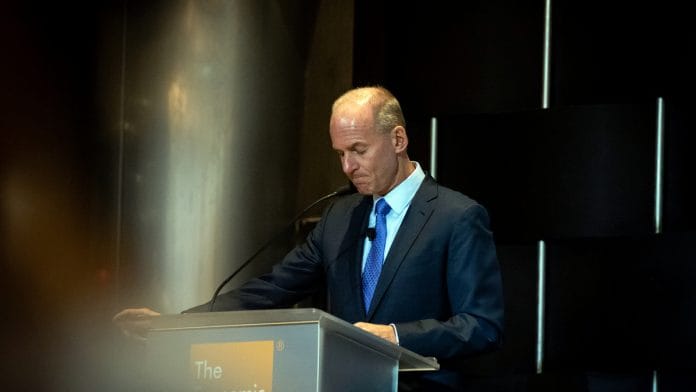Chicago/Washington: Boeing Co. Chief Executive Officer Dennis Muilenburg plans to kick off a pair of critical appearances before U.S. lawmakers by admitting the planemaker made mistakes on the 737 Max, even as a fresh allegation emerged that the company withheld key safety information ahead of two fatal crashes.
Muilenburg is the first company official to publicly testify on Boeing’s role in the tragedies that killed 346 people and badly dented public confidence in the manufacturer. Riding on his performance this week are the industrial titan’s reputation and his own tenure at the helm of the world’s largest aerospace company amid heightened scrutiny from the board and investors.
“We know we made mistakes and got some things wrong,” Muilenburg will tell the U.S. Senate’s Commerce Committee on Tuesday, according to an advance copy of his testimony released by the company. “We own that, and we are fixing them. We have developed improvements to the 737 Max to ensure that accidents like these never happen again.”
In his prepared remarks, Muilenburg didn’t elaborate on on how the company’s design and testing broke down. But the Democrat leading a second hearing Wednesday at the U.S. House of Representatives hinted that a previously undisclosed lapse is among the issues on which lawmakers will question the CEO.
Boeing engineers concluded that the Max faced potential catastrophe if the safety feature implicated in the fatal crashes activated for just 10 seconds without pilots recognizing it and responding appropriately, said Representative Peter DeFazio, the Oregon Democrat who is chairman of the Transportation Committee.
“Now, that was never clearly communicated to the FAA, as far as we can tell,” DeFazio told reporters Monday. “Was that intentional withholding or unintentional?”
Muilenburg’s trip to Capitol Hill coincides with the one-year anniversary of the first 737 Max crash, a Lion Air jet that plunged into the Java Sea off the coast of Indonesia minutes after takeoff. The CEO visited the Indonesian Embassy in Washington to meet with the ambassador and “pay our respects to those lost aboard Lion Air Flight 610,” Boeing said in an email.
Less than five months after the accident in Indonesia, an Ethiopian Airlines aircraft slammed into a field. That prompted a global grounding of Boeing’s best-selling jetliner and shook confidence in the planemaker’s integrity.
The Chicago-based planemaker has redesigned flight-control software linked to the crashes, known as MCAS, to ensure that the system no longer has a single point of failure and can’t be activated repeatedly. MCAS — short for Maneuvering Characteristics Augmentation System — was triggered by erroneous sensor readings in both crashes.
When regulators lift the flying ban on the Max, “it will be one of the safest airplanes ever to fly,” Muilenburg will say.
Also read: Only 4 seconds to respond? Faulty assumptions led to Boeing 737 Max disasters
Senate Grilling
Senators will have a chance to grill the CEO on Tuesday. Ted Cruz, a Texas Republican, said he would focus on understanding how the accidents happened.
“What went wrong on the regulatory process?” he asked in a video before the hearing. “Why did they sign off on a training system where the pilots aren’t told about this new operation that could endanger the system? And how can we fix it? How can we make it better?”
Senator Roger Wicker, a Mississippi Republican and the Commerce Committee’s chairman, told reporters on Monday that he forsees a legislative response once the inquiries into the Max have been completed.
“I think there’ll be some statutory fixes,” Wicker said at the Capitol. He added that among the questions he had for Boeing were: “is the plane ready to go, and then what mistakes were made and what’s to prevent them from happening in the future.”
Muilenburg admits that the manufacturer has done a poor job of explaining the flight-control function to pilots. U.S. regulators agreed to omit MCAS from the plane’s flight-crew operations manual at the request of a Boeing official.
“Our airline customers and their pilots have told us they don’t believe we communicated enough about MCAS — and we’ve heard them,” Muilenburg will say. Boeing has worked with airlines and pilots to test its redesigned software and offer feedback on training and educational materials, he says.
‘How Could That Ever Happen?’
DeFazio made clear that Muilenburg will face stern questioning.
“How did you design an airplane with a single point of failure wired to a safety critical catastrophic system?” he said. “How could that ever happen? Why did it happen? What happened to your company?”
U.S. House lawmakers are considering making changes to current law, which allows the FAA to deputize employees of aircraft manufacturers such as Boeing to certify designs, DeFazio said.
While the FAA was involved in early stages of approving MCAS, the agency largely ceded oversight to Boeing as the system evolved. That evolution, which made the software capable of more aggressive nose-down movements, was cited last week in the Indonesian National Transportation Safety Committee’s final report on the Lion Air crash.
DeFazio also intends to seek legislation that would limit the ability of Boeing and others to make changes to existing aircraft without having to recertify them from scratch — potentially adding new cost and time to the approval process of new aircraft such as Boeing’s 777X. The 737 Max was certified as an amended version of earlier models from a design dating to the mid-1960s, which partially exempted systems on the plane from new regulations.
The Max tragedies should spur a broader discussion about the role of regulation by the U.S. government after decades of deregulation and funding constraints for agencies with critical oversight of industry, said Richard Aboulafia, an aviation consultant.
“The government has a lot to answer for, too,” Aboulafia said by phone. “This is the close cousin of people who monitor water-quality in Flint. There needs to be a broader debate about providing resources to regulatory agencies.” – Bloomberg
Also read: Boeing’s sudden leadership shakeup shows its always in reaction mode






